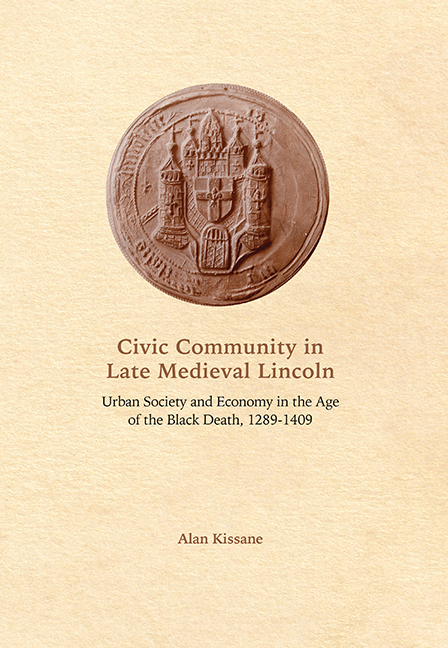 Civic Community in Late Medieval Lincoln
Civic Community in Late Medieval Lincoln Book contents
- Frontmatter
- Contents
- List of Illustrations
- Acknowledgements
- Abbreviations and Note on the Text
- Introduction
- 1 Urban Foundations: Occupational Structure
- 2 Lincoln as Entrepôt: Tolls, Trade and Credit
- 3 The Crown and the Fee Farm
- 4 The Growth of Civic Government
- 5 Fraternity, Orthodoxy and Communal Cooperation
- 6 Chantry Founders, Commemoration and the Rental Market
- Conclusion
- 1 Appendix 1: Occupational Sources and Data
- 2 Appendix 2: Lincoln Civic Officials, 1289-1409
- 3 Appendix 3: Lincoln Members of Parliament, c.1290-1410
- 4 Appendix 4: The Fraternal Year
- 5 Appendix 5: Perpetual Chantry Foundations
- Bibliography
- Index
4 - The Growth of Civic Government
Published online by Cambridge University Press: 27 April 2017
- Frontmatter
- Contents
- List of Illustrations
- Acknowledgements
- Abbreviations and Note on the Text
- Introduction
- 1 Urban Foundations: Occupational Structure
- 2 Lincoln as Entrepôt: Tolls, Trade and Credit
- 3 The Crown and the Fee Farm
- 4 The Growth of Civic Government
- 5 Fraternity, Orthodoxy and Communal Cooperation
- 6 Chantry Founders, Commemoration and the Rental Market
- Conclusion
- 1 Appendix 1: Occupational Sources and Data
- 2 Appendix 2: Lincoln Civic Officials, 1289-1409
- 3 Appendix 3: Lincoln Members of Parliament, c.1290-1410
- 4 Appendix 4: The Fraternal Year
- 5 Appendix 5: Perpetual Chantry Foundations
- Bibliography
- Index
Summary
In 1948 Sir Francis Hill published his most famous work, Medieval Lincoln, which provided a full and rich narrative of the city's growth from the period of the Conquest to its late medieval decline, an account which to this day remains the standard text for the city. As part of his narrative, Hill described the emergence of Lincoln's civic government from the mid-twelfth century, arguing that since at least that time there had existed in the city a ‘court of burwarmote’ presided over by a bailiff or reeve, where all the city's pleas were heard. He charted how, from at least 1219 onwards, constitutional developments saw the introduction of a council of ‘twenty-four’ members headed by the newly instituted mayor (c.1206), a development seen in many other urban centres including Winchester, Dublin, Leicester and Exeter, all of whom were responsible for overseeing the laws and trading rights of the civic jurisdiction. From the ‘twenty-four’, or ‘mayor's council’ as it was also known, the incumbent mayor and two bailiffs were chosen. Hill highlighted that by a relatively early stage the ‘twenty-four’ were divided into two groups of twelve, representing the majores, or ruling citizens, on the one hand and the secondarii, or middling citizens, on the other, though he stressed that these two groups were not exclusive, with ‘the same kind of people’ on either side of the divide, there being ‘men who will later rise to civic office and men of professional standing … among the secondarii’, a situation, he concluded, which continued well into the fourteenth century. Hill also highlighted how the council of ‘twenty-four’ stood as little more than a symbolic title, with membership fluctuating throughout the fourteenth century between eighteen and thirty, which led him to claim that it was very much like a ‘modern committee not unduly fettered by a constitution’. Nonetheless, Hill also stated that the ‘twenty-four’ underwent a decline after the Black Death, when it became increasingly difficult to maintain their number; they were recorded for the final time in 1392.
Despite the apparent decline of the mayor's council, Hill nevertheless identified how in 1422 the ‘whole commonalty’ congregated to decree a ‘change in the civic body’ in all matters regarding the good of the community, which effectively introduced new rules regarding the use of the common seal.
- Type
- Chapter
- Information
- Civic Community in Late Medieval LincolnUrban Society and Economy in the Age of the Black Death, 1289-1409, pp. 124 - 155Publisher: Boydell & BrewerPrint publication year: 2017


